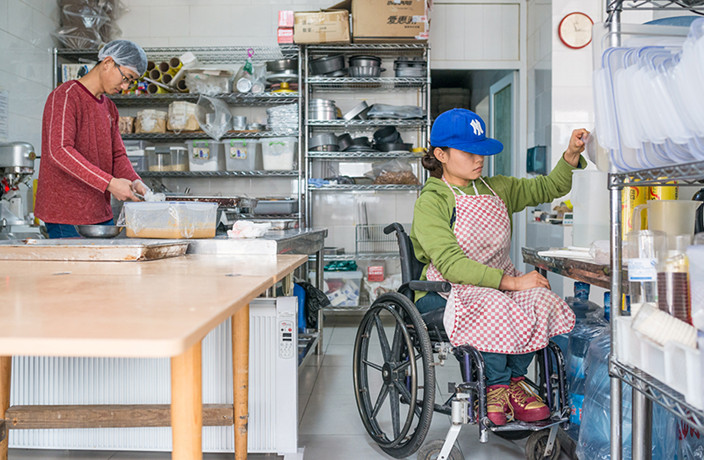Spring Festival in China means two things: family and food. With millions of people preparing to leave Beijing for a week of festivities in their hometowns, a family of a different kind is hard at work in the border city of Langfang.
This time six years ago, Grace Yang, now aged 29, didn’t have much of a family. She was abandoned at the age of four after contracting polio, which left her unable to walk, and she grew up in a state-owned orphanage. In China, children can only be adopted before the age of 14. After that, they must find foster homes to take them in, or hope that their orphanages allow them to stay on.
Yang was in her early 20s when she was introduced to the Bread of Life Bakery, an organization that trains disabled orphans in baking and cooking. She was “just biding her time, without anything too meaningful to her [life],” explains manager Danny Mun. Now, Yang is one of the lead bakers and mentors at the bakery, which also teaches orphans how to look after themselves in preparation for an independent life.
Bread of Life Bakery was opened in 2008 by Keith and Cheryl Wyse, the American founders of Agape Family Life House, a Langfang foster home for orphans with osteogenesis imperfecta, or brittle bone disease. The bakery now sits alongside the foster home in a small compound where orphans live, are home-schooled, and receive specialist medical attention. The whole project is overseen by Mun, who is also from the United States, and his wife Sarah. The couple live on-site with the children; Mun manages the bakery, which supplies cakes, breads and pastries to restaurants and cafes around Beijing.
The bakery itself is a fairly unassuming outfit. On the day that I visit, Yang, Mun and Stacey Huang – the other lead baker, who has only partial use of her hands after being caught in a house fire as a child – are tidying up after the Christmas rush. The facility consists of two main rooms, which are kitted out with industrial ovens and baking equipment, and a small personal kitchen where the bakers prepare meals for themselves and the younger children living in the neighboring foster homes. The buildings are simple and functional, although a tour of the children’s homes reveals warm hubs of activity full of toys, arts and crafts materials, and a water therapy pool which helps kids with brittle bone diseases rebuild muscle strength.

Lead baker Stacey Huang works with only partial use of her hands
“Our main [purpose] here isn’t just to give people a job, but really prepare them for a life of independence,” says Mun. In their apprenticeships at the bakery, Yang and Huang have learned how to leaven bread and whip up a Chantilly cream, but they’ve also become mentors for the other orphans. Not all trainees have lasted as long – other bakers left early to do other things, “mostly getting married,” and one chose to leave because she couldn’t handle the psychological demands of the work. Yang sympathizes: “I found it really difficult [when I started]. It was mentally strenuous, emotionally strenuous and physically strenuous. I’d never had to do any of this [before].”
Neither Yang nor Huang had any experience or knowledge of baking before coming to Bread of Life. They knew little of the project before arriving.
“When Geoff [a volunteer for Bring Me Hope, an orphanage that the bakery used to work with] first told me about this place, he said they would help me to walk,” Yang tells me. “He said there’s a place that helps people with orthopedic needs, so they might be able to help you with those, and you can also do some studying… he didn’t say anything about a job.”
But a job it was, and a challenging and rewarding one at that. Education is the guiding mission at Bread of Life, as a means of empowerment and teaching leadership by sharing knowledge. Yang and Huang both talk about how much they’ve learned at the bakery, as well as how much they have ahead of them.
Of course, baking is not just sugar and spice and all things nice. It is physically demanding, and the bakers lead structured lifestyles of 8.30am starts, 6pm finishes and limited opportunity for a social life. They live on-site in the gated Agape community, with scant prospects for entertainment in the nearby area. The closest neighbor is a BMW showroom. On Sundays, they have church meetings, which widens their social circle somewhat, but Yang says that the other worshippers are usually too old or too young for her to form meaningful friendships with.

A typical workday at the Bread of Life bakery
There are also wider cultural challenges. Mun tells me how the bakers were at first reluctant to interrupt mealtimes to knead dough or check the ovens. “But the dough waits for nobody,” was Mun’s message, as he gradually encouraged his charges to be more flexible toward the job at hand. Beyond the walls of the bakery, the team also has to navigate hostile attitudes towards disabilities.
“In the end, it’s just a lack of awareness,” insists Mun. “Especially for people in wheelchairs, because people just assume that wheelchairs are for when you’re older – when you’re a grandma or grandpa – or for people who are injured. But then they see our kids. They see Grace who doesn’t have a cast or anything, so they’re like: ‘But you’re so young, why are you in a wheelchair? Why are you like this?’
“If I put myself in their shoes, I would probably be really uncomfortable [too], but part of the process here is to explain to them. They just don’t know.”
Awareness is on the rise though, and places like Bread of Life have received growing media attention. In 2013, CCTV made a feature-length documentary about the bakery, and the bakers have since been asked to take part in various interviews and television appearances. “It’s good for business, but at the same time it can be too much,” says Mun.
In the early days, Mun would “impose” media appearances on the bakers. “You guys should do this because it helps the foster home or it helps the bakery, eventually it will help you. You should make that sacrifice,” he remembers telling them. “Then last year, a young woman here said, ‘I really don’t want to do it.’” The woman in question had been featured in a video in her hometown when she was in high school, “and it just made her feel really bad…everybody [knew her as] the girl with no arms, and she just thought, “It’s too embarrassing.”
Mun still encouraged her take part in media appearances for the bakery, but when she told him, “Danny, you’re telling me I can choose, but you’re giving me no choice,” he realized his own double standard. “That really hit me to hear it so bluntly – I [was] doing exactly what we’re trying to advocate other people not to do.” Nowadays, it’s up to the bakers if they want to participate in interviews. “I’ll give the initial OK, but if you want to interview them personally, that’s up to them.”
‘Choice’ is a muddy concept in circumstances like these. Although Yang and Huang choose to work at Bread of Life, they have few other options – evidenced by the fact that former colleagues have generally left for marriage rather than alternative jobs. Mun emphasizes that the mission of the bakery – and of the wider Agape Family Life foster homes – is to give orphans here more options and independence. He pays the bakers in carefully measured and rising salaries, helping them to manage their own money, and everyone learns how to cook, clean and look after one another.
But there is a limit to how much one organization can achieve in a society in which, despite the best efforts of people like Mun and his colleagues, can still be hostile to disabled people. Many of the younger children see a job in the bakery as inevitable, Mun tells me, despite him teaching the children that they can choose other paths.
In a country where only a quarter of disabled people are employed, it’s not wholly clear where these other paths lie. In recent years the Chinese Government has introduced a quota requiring all companies with more than 20 employees to fill 1.5 percent of positions with disabled employees – or pay a fine that contributes to social security for people with disabilities.
Most companies opt to pay the fine. Still, places like the Bread of Life bakery are both physically and spiritually breaking bread with mainstream society, and demonstrating the creative potential of people with disabilities. Baking isn’t a perfect solution to the challenges faced by disabled people, but it’s one of the sweeter ways of getting there.
Images by Aurelien Foucault




















0 User Comments